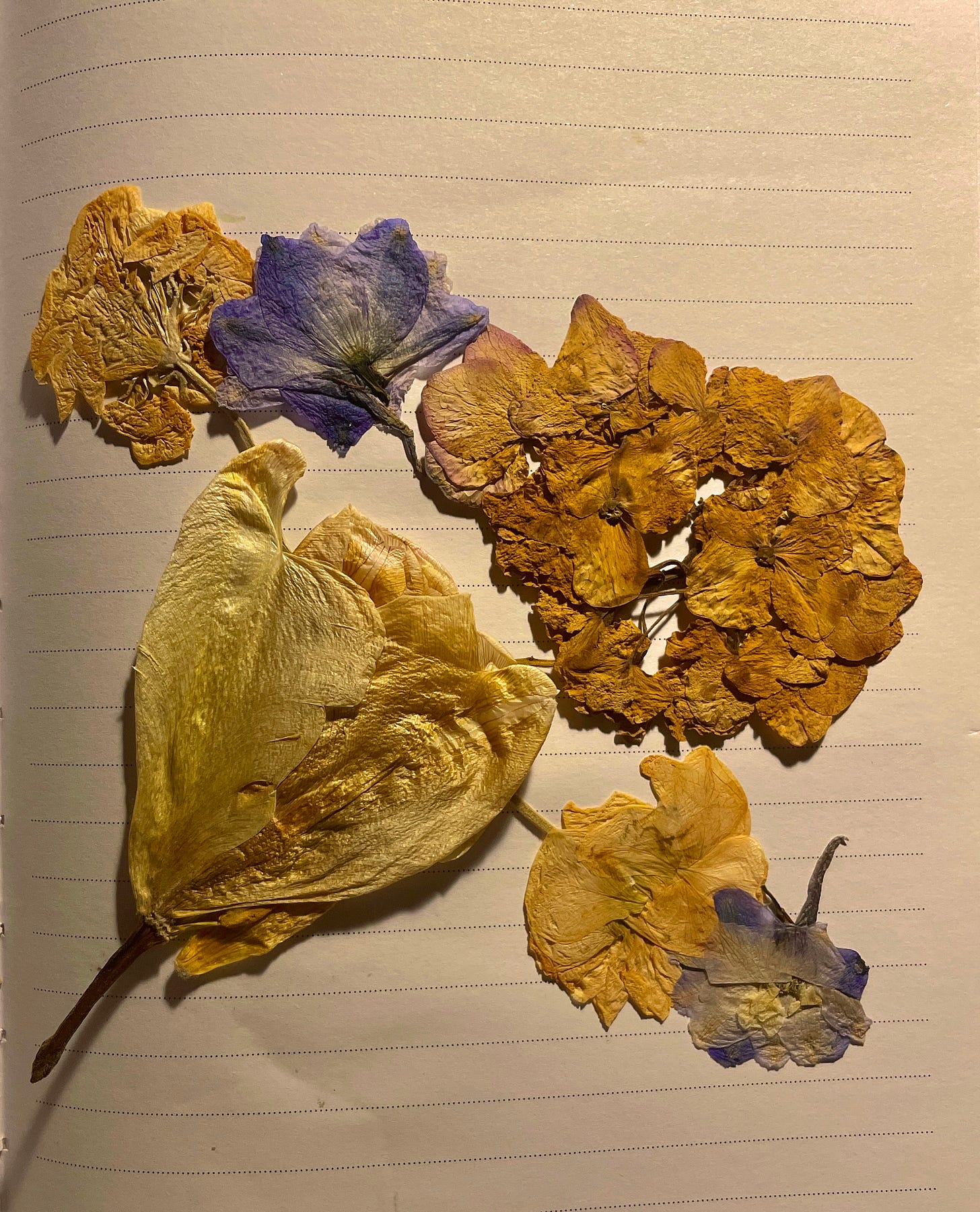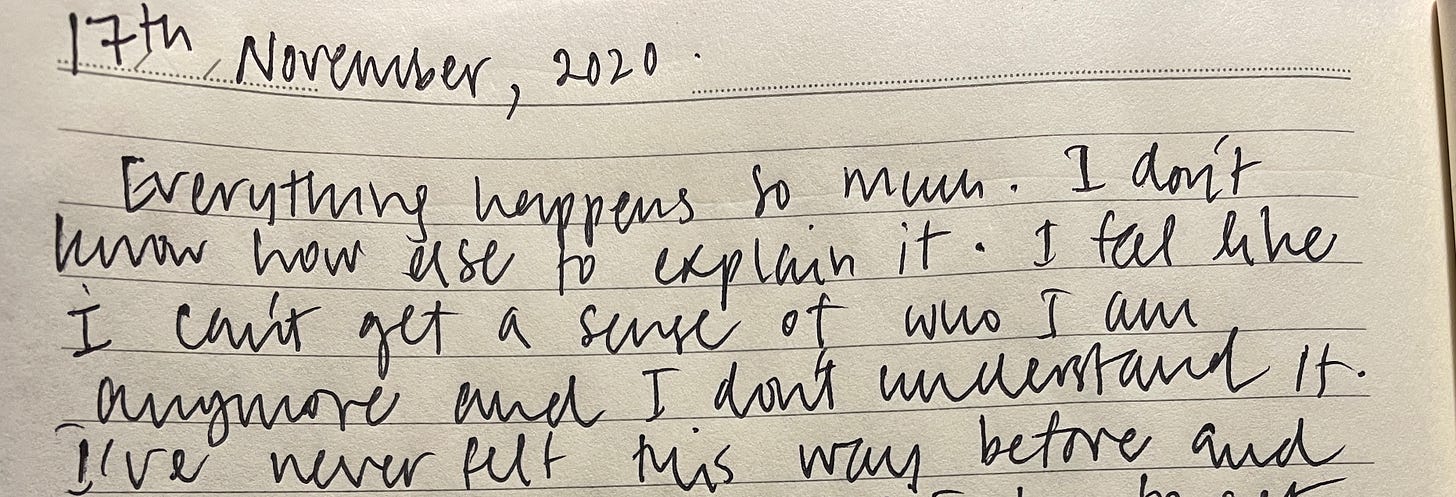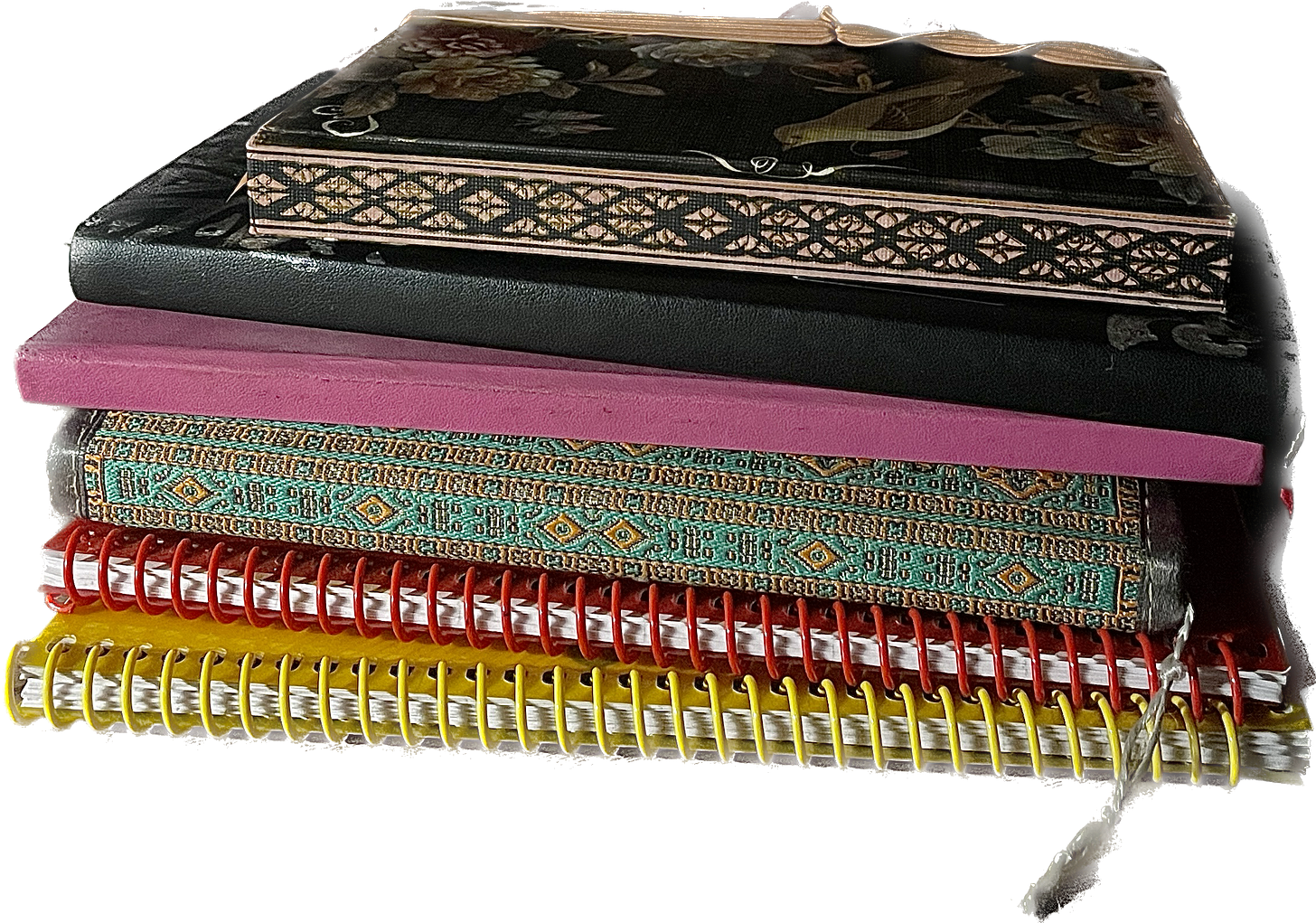journaling as a practice in timekeeping
alternatively titled: I am not the same person I was one journal entry ago
When I was 8 years old, my childhood best friend and I started a BFFs diary. We tucked it away in an old shoebox, that was then hidden in the overgrown grass of the little sliver of abandoned land between our neighbourhood and the next.
We would make the treacherous journey along the narrow – and in hindsight, dangerous– edge of a 6-foot drain, and then crawl on our hands and knees in the tall grass until we found the box that housed our shared diary.
We’d take unscheduled turns filling it in whenever we felt like it, and neither of us ever told the other when we last wrote in it. This made flipping through the pages a Schrödinger’s cat moment - the diary held something new and didn’t.
In those pages, we wrote about things of such consequence, at least by the logic of two 8-year-olds. We’d recount shared memories between the two of us, detail the exact location of new hiding spots we’d discover together, or make plans to best optimise our playtime over the weekends when we were free from the shackles of homework and allowed to be out till dark. We’d sometimes jot down stories from our days at school, or passive-aggressively retell a fight the two of us had got into about things that, I’m sure, were of great significance at the time (and then, the very next entry would contain a tearful apology).
We’d reassure each other that we were monogamous in our pact to be best friends forever, complete with two dotted lines for each of us to sign above our full government names.
We’d sometimes even leave little trinkets in the shoebox as a surprise for each other - friendship bands made from the yarn we’d steal from my grandma’s sewing box, wildflowers we’d pick along the way, and the rare piece of candy. The book was plastered with High School Musical and Hannah Montana stickers that we’d acquire from the Goodie Bag magazines we both collected religiously at the time.
Time, as memorialised in the BFFs Diary, was an uncoordinated rhythm that was only ever understood by the two of us at 8 years old. It was our out-of-sync way of documenting, expanding, and contributing to our friendship. We were not merely keeping each other in the loop, we were inscribing our shared history.
We were girls together, and there, in a little shoebox, hidden in the overgrown grass, was proof.
The very first page of my most recent journal is heavy with a poor attempt at flower pressing.
My university graduation came in April, and before I knew it, I was blinking back tears on a plane back home.
Graduation itself was a day that lingered in my mind — the closing of a chapter made all the more bittersweet by the acute awareness of my place in the unfolding passage of time. The day was far too beautiful, far too momentous for me to not memorialise in some way. And now, a flower from each bouquet I received from friends and family on the day, remains pressed onto the first page of my journal forever. a memento of one of the happiest days this year.
Holding my now complete journal in my hand, I think about every single version of me in the last year, who had reached for the safety of these pages—whether in gratitude, hope, anger, or pain.
It’s a book that is weighed down not just by the flowers or the sentimental value given to the movie ticket stub.
It is the weight of time.
I start off an entry one person, and as I sign off, I feel changed, absolved, redeemed, and heard.
The first time I started consistently writing down my thoughts on paper for just myself, was somewhere between the first COVID lockdown and the third. This time the notebook on which I made sense of the sudden standstill the world had come to and my place in all of it, was a crucial lifeline. A modest attempt at meaning-making.
In a 2017 study titled Governance by algorithms: reality construction by algorithmic selection on the Internet, it was established that technological advancements, and as such, technological issues, have evolved and expanded so rapidly that they are being seen and treated as policy issues.
This we know.
This intentionally pivots the conversation around technology to redirect it from a utilitarian/functional standpoint to one that recognises that technology (software) is design/reality construction.
Just and Latzer – the authors of the paper – assert that algorithms especially have the ability to shape and reshape behaviours, beliefs, activities, etc. People (particularly young people) are increasingly being socialised by algorithmically driven social media platforms, more so than traditional institutions like schools, workplaces, or even the family. With algorithms curating what we see, hear, believe in and engage with, it tracks that technology is no longer neutral and instead, embodies and shapes individual and collective worldviews.
The interruption that COVID forced upon the world was a curious thing.
Amid the inundation of news stories about the frenetic speed at which it was moving, the world as we knew it…paused, and we were quite literally left to our own devices. We retreated indoors — as was mandated— and in doing so, shed the institutions and intermediaries that governed us on the daily, and there to take their place…were the algorithms.
Interestingly, this study was done in 2017, a year before TikTok merged with its predecessor; musical.ly. 2017 was also a couple of years before former musical.ly users (who were former dubsmash users, who were former vine users and/or enjoyers) quietly sidestepped their staunch loyalty to musical.ly following its demise.
The smear campaign against TikTok in solidarity with the slain musical.ly was driven by the accusations that it is a) cringe and b) for children. Enter COVID and the promises to denounce TikTok were swiftly forgotten, as the app grew with an astonishing velocity that too can be described as (trigger warning) unprecedented. If Just and Latzer asserted in 2017 (!) that algorithms are replacing governance structures, then I imagine that in 2024 they might well argue that algorithms don’t just shape the user experience; they have become architects of the human experience itself.
“Connection” in the early pandemic months, no longer resembled the laughter, conversation, and the cradle that was unique to lovers, friends, family and community. It instead echoed the hum of a rapidly evolving social sphere where intimacy was a mirage I fell for each and every day.
The app became a space where people could express that they were bored in the house and they were in the house bored (over and over and over again), along with the absurdity, loneliness and purposelessness of being indoors. We were witnessing the collective experience of a world paused.
Taking the place of the social order I was accustomed to, was a shared social reality; one that dictated my aspirations, defined how I should look, and prescribed the products to achieve the look. It told me, insistently, who I was and who I should become.
It was a clusterfuck of aesthetics between cottagecore’s escapist soft pastels, the fishnets and bold eyeliner that represent the e-girl/alt girl, “that girl” and her empty “wellness” bordering on disordered eating – it's ironic that we had never needed to touch grass more than for when we were not allowed to be outside.
All of this is to say that I was not so much on the precipice of…something…like I believed, then. Rather, I was at a cliff’s edge and turning back was no longer an option. My parents would turn on the news everyday and we’d hear of hospitals up to capacity, vaccines running out, death tolls rising faster than modern medicine and science can keep pace. The air was thick with uncertainty, and living with 2 severely immunocompromised people at home put us in an incredibly precarious position.
To look up from the scroll would be to stare into the barrel of the gun; to confront the raw gaping reality of a world seemingly coming undone.
I felt myself slipping away. My sleep tattered and fragmented. My anxiety was cruising at altitudes it has never before seen, and I was running out of oxygen. The tether between myself and the ground I walk became more fraught by the day.
The algorithm, sensing and preying on my weakness, fed me versions of my world I didn’t recognise. Versions of myself I didn’t recognise. I realised that I was left grappling with who I was, what I remembered of myself, and how it can fit into this new, digital-first, isolated existence.
And that is when I turned to journaling once again, no longer a pastime as much as it was a hopeful attempt to find myself beneath the noise, the filters and the godforsaken unprecedented-ness of it all.
It was there, on those pages, that I began to reclaim who I once was.
It offered me a window of opportunity to resist the incessant recalibration of identity in a world that felt paused just as much as it felt like it was on fast forward.
I began asking myself questions I imagined I’d ask on first or second dates. What do I value right now and where and in whom do I see it manifest? What about the current moment frightens me? What do I believe in publicly? What do I believe in privately? What do I wish more people believed in? How do I practise spirituality in a world speeding towards total secularism?1 Do I believe in a higher force because I am more afraid to not believe in anything at all?2 What the fuck are my hobbies?
I was, essentially, in a talking stage with myself.
In hindsight, I find it quite funny that my remedy to the overstimulation was not to limit or draw clearer boundaries with the screens that controlled me, but to map out each feeling on paper.
In my memory, the months in isolation in 2020 feel like one very long, very confusing, very bad day. They blend into one another so much that playing those memories back feels like an out of body experience. Like I was a passive observer of the time, from the outside looking in. I turn back the tapes and I see the screens, the gradual descent into a long and lonely depressive state against the backdrop of ‘Lottery’ by K Camp (famously known as the renegade song).
While the screens were an escape – the cost of which I hadn’t yet fully conceptualised – the quiet, solitary, almost obligatory act of journaling is how I grounded myself. The spiral of conflicting, intertwining emotions seemed so much more conquerable when I could visualise them on a tangible medium, or better yet – when they were distilled into a smattering of bullet points under the scrawly title: here’s why (i think) i’m upset.
When my very existence felt as though it teetered between the mundane and the absurd – like a movie described on letterboxd reviews as both “dogshit” and “genre-bending” – chronicling those feelings and documenting the moment felt like a record of my existence. Like proof that I still existed.
Dear Diary, who tf am I talking to?
I often think about the epistolary form of journaling. That the oldest known opening to an entry was “dear diary,” that little salutation – so innocent, so profound. Somewhere between those 2 words written in colour pencils, each letter perfectly legible, freestanding, and the monochromatic, hurried cursive of my adult years, is an archive of who I was, who I’ve been and who I’ve always returned to.
Flipping the pages of more recent journals, I find that while the ritual of the tried and true “dear diary,” has gathered dust on the shelf of time gone by, I still, unconsciously, address my journal like a separate entity. For the occasionally long lapses in time between entries, I find myself, almost sheepishly, explaining my absence.
Who is the journal for, if not ourselves? Who am I writing to?
Who are you writing to?
It feels bizarre to hold the journals from the past years in my hands. To look at them stacked upon each other, not so much completed journals but volumes of the Self. Feeling the emboss of the words from the previous pages like a bygone memory, the precise feeling of which is now elusive, only known to a past version of me. One who touched these pages and then slid the ribbon to mark the page, the progress.
The sadder entries are splotched with tears blurring the ink, the words disappearing into each other; the memories vivid, but somehow softened by the knowledge that (while I didn’t know it then) here in my hands, is a thing of the past. The happier entries are far less legible. There is an undercurrent of urgency that buoys my words – written much faster, the words colliding into each other, almost as though the feeling itself might run its course if I don’t capture it fast enough.
The incongruent character of journals, the non-sequiturs between entries like hairpin bends, is a reminder of how the journal doesn’t demand consistency. In fact, it thrives on contradiction.
Every entry, a dialogue between the Self of the present and the Self in progress. I am never the same person I was one journal entry ago. The person who picked up the pen is rarely the same person who puts it down. It is a constant reinvention of the Self – a metamorphosis on our own terms. A kind of meaning-making that counterbalances the pace and prescribed uniformity of a world that insists on imposing orders, processes and timelines. A rebellion against the expectation to fit neatly into narratives (see also: aesthetics), and expectations of progress and productivity.
There’s a part of me that believes in the necessity of this dialogue. A dialogue between the self in relation to the past, and the self in relation to the future. The epistolary nature of the exercise suggesting an innate need to situate the Self in relation to Other. The journal, from this angle, reveals how writing is a solitary act almost as much as it is deeply social. Where the Self is reflexively constructed not in isolation, but in conversation with the world.
I often see people ask “how do I start journaling?” “how can I make it a habit?” “what should I write about?” or:
I don’t have all the answers but I hope this essay has offered you some perspective.
I view journaling as a process of meaning-making and time-keeping. My journals have in them photos and paintings, interesting facts I come across or information I’ve learnt. Learning via journaling is something I’ve felt quite passionately about. “Learning” in this instance is referring to the autonomous process of seeking out information on your own time, and making a concentrated effort to absorb it, preserve it and reflect on it in ways institutional academia doesn’t always allow.
I write down ideas and map out essay structures, and I sometimes even press flowers! I write Very Serious movie analyses and reviews that will never see the comically unserious light of the letterboxd day. My journal has become a space where all of these curiosities, musings, aspirations, reflections coexist.
It's a space where the trivial and seemingly profound are given equal weight, unravelled in sharp pivots. Where rubrics, metrics and even timelines are deconstructed and re-explored. It is whatever I want it to be – but always preservation of time, a shaper of meaning, an exploration of the Self endlessly in flux.
if you like my work and would like to support me, you can do so by buying me a coffee :)
okay, this is like 3rd date material but whatever
1000 vine booms








sooo deeply felt! i feel like i journal half to get the feelings out and put some tangibility to whatever feels like an incomprehensible mass in my head -- but also because i know the satisfaction of being able to read it a month, a year later and look back on it as a version of myself who knows more now. i am a lot kinder to myself retrospectively and i can have grace for who i was because the diary lets me distance myself just a little bit ? if that makes sense ?
This has inspired me to wanna journal again🥹